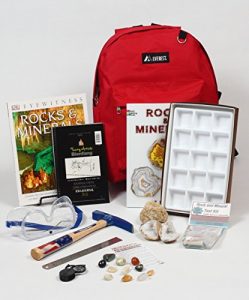by Alecia Rolling
 So, what are discovery backpacks? These are the latest fad in state and federal park and museum programs. Bringing to young students “hands-on” in a bag, these themed packs offer information resources and the tools to learn. Families who visit the park or museum can “rent,” usually for free, such a backpack to carry around during their visit. As they have leisure time, the backpack is a great way to learn more about the animals, plants, or objects being studied through books, journals, and tools for learning (compasses, rulers, binoculars, etc.). How does this new idea fit into my homeschool? Why would I want something useful at a museum? For those moments when I am too tired to think of something exciting! For those moments when my hands are full, but my child is begging for something enriching to do! Just grab the bag, reach in, and see what can be done! Okay. Sounds great, but how do I do this with my Schola Rosa curriculum?
So, what are discovery backpacks? These are the latest fad in state and federal park and museum programs. Bringing to young students “hands-on” in a bag, these themed packs offer information resources and the tools to learn. Families who visit the park or museum can “rent,” usually for free, such a backpack to carry around during their visit. As they have leisure time, the backpack is a great way to learn more about the animals, plants, or objects being studied through books, journals, and tools for learning (compasses, rulers, binoculars, etc.). How does this new idea fit into my homeschool? Why would I want something useful at a museum? For those moments when I am too tired to think of something exciting! For those moments when my hands are full, but my child is begging for something enriching to do! Just grab the bag, reach in, and see what can be done! Okay. Sounds great, but how do I do this with my Schola Rosa curriculum?
The Schola Rosa: Co-op & Home Curriculum takes a “Naturalist’s” approach to Science. Our Science curriculum has weekly nature journaling tasks and assignments, which get you and your children outdoors learning about the world around. As an extra DIY project, you might consider building a Naturalist’s Backpack to fit the Schola Rosa Unit of the week. Simply pack your supplies and go with your assignments in hand! This is not a feature provided by the Schola Rosa Curriculum, but why not make a useful fad fit in? Why not have those activities ready-to-use for when you are tired, busy, or just want some inspiration? You can buy ready-made backpacks in the Schola Rosa Bookstore! If you are just looking for some extra books and resources for your backpack, see our Bookstore for additional book and guide suggestions, too!
Here are some basic items you could add and be ready for discoveries with the Schola Rosa Science program!
- Nature Journal
- Pencil Colored Pencils
- Binoculars Magnifying Glass
- Information Resource (Golden Guides)
- Plastic Baggies (Sandwich bags or zip-lock)
- Plastic Containers with Screw Caps (Empty Peanut Butter Jars, etc.)
- ruler or tape measurer
- compass
- Insect/Small Animal Containers
- Tweezers
- Rock Test Kit
- Rock Hammer
- Goggles/Eye Protection
- Rubber Gloves
- pH Test Strips
- Magnets
